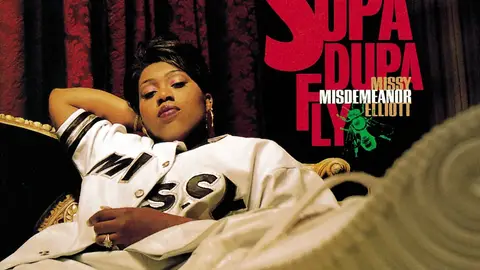Sockin' It to 'Em: Missy Elliott's "Supa Dupa Fly" and the Queering of Hip Hop

After a fish-eye-lensed Missy "Misdemeanor" Elliott flopped onto television screens 22 years ago decked out in an inflated trash bag, nothing would be the same again. Well, at least hip hop wouldn't be the same.
The music video for Elliott's first solo single, “The Rain (Supa Dupa Fly),” was unlike anything the genre had seen or heard before. And the same could be said for the musician herself. With her debut album, Supa Dupa Fly, released this week in 1997, Elliott established herself not only as a singular rapper, but also as an irreverent visionary unafraid to push hip hop into more experimental and avant-grade directions, her videos deftly toying with and subverting gender stereotypes.
The rap world in 1997 was in disarray. In March of that year, the Notorious B.I.G. was gunned down in Los Angeles, a year after his rival Tupac Shakur suffered a similar fate in Las Vegas. In the eyes of the media, hip hop was overwhelmingly black, overwhelmingly male, and overwhelmingly violent. Only a handful of women had found a seat at the genre's hypermasculine table, often having to sexualize themselves in order to do so.
Elliott's friend and occasional collaborator Lil' Kim was the biggest female MC at the time of Supa Dupa Fly's release. Ultra feminine in appearance but able to spit like a dude, Kim set the bar for mid-'90s female rappers. She rocked furs and bikinis, multihued wigs, and dramatic makeup—a form of drag unto itself. Elliott opted for a more androgynous look on- and offstage—sweatsuits and her trademark finger waves. But that inflated trash bag was the beginning of something else entirely.
Whereas Kim flaunted her body, Elliott amplified hers to comedic extremes, getting sweet revenge on an industry that told her she was too fat to be a star. In subsequent videos, her looks grew more outré, either playing up her femininity to parodic heights, opting for total androgyny, or flaunting a mix of the two.
She was a Mega Man–esque intergalactic superhero in "Sock It 2 Me":
A living princess doll in "Beep Me 911":
And, alternately, a medieval sorceress and a bespoke gangster in "Hit Em Wit da Hee":
She arguably hit her queer, off-kilter peak with her black, bald, and bondage-y video for "She's a Bitch," the lead single from her second album, Da Real World, which celebrated its 20th anniversary last month.
Elliott's idiosyncratic personality and style led to rumors that she's a lesbian that persist to this day—she's been linked to everyone from her protégés Aaliyah and Tweet to, most recently, R&B singer Keri Hilson and reality star Eva Marcille of The Real Housewives of Atlanta.
As they blaze their trail through a male-dominated industry, nearly all female rappers are subjected to gay rumors. Some are more persistent than others: Elliott, Da Brat, and Queen Latifah immediately come to mind. No doubt stoking the sapphic flames, Elliott joined the seminal sisters-doing-it-for-themselves music-fest Lilith Fair as part of Supa Dupa Fly's promotional tour, becoming the first rapper to appear on the bill.
Missy Elliot at Lilith Fair at Jones Beach, New York, on July 16, 1998.
But no matter how genre-defying or groundbreaking Missy Elliott was, she came of age when hip hop was stridently homophobic, when the thought of a rapper being out and vocal about it was unthinkable.
Writing about the queering of hip hop in The Guardian in 2013, Hattie Collins recalled the infamous "faux lezfest at the 2003 MTV VMA Awards" in which Madonna smooched Britney Spears and Christina Aguilera. Lest we forget, Missy was there, too.
Collins recounted asking her at the time why she didn't join in "with the snogging":
[Missy] looked at me aghast and nearly choked on an M&M. "No, no, no," she gasped, "Hip-hop would never do that. Never, never, never in a million years."
Only recently have queer rappers been able to be open and successful. The most recent example: Lil Nas X, who came out at the tail end of Pride Month this summer. His hit song "Old Town Road" is spending its 15th week as the No. 1 song in the country. Meanwhile, acts such as Young M.A, Mykki Blanco, Brockhampton's Kevin Abstract, and Angel Haze have managed to carve out their own kind of stardom.
For her part, Elliott has never shied away from sexuality in her music—she's just always presented herself as a purveyor of heterosexual desire. How close this public persona hews to her private self is up for debate, but for all the things that make Missy Elliott queer, her sexuality is the least of them. It's her otherness that opened the door so that the next generation of rappers can walk on through.
Missy, more than any other hip-hop artist in recent memory, made it okay to be different.





